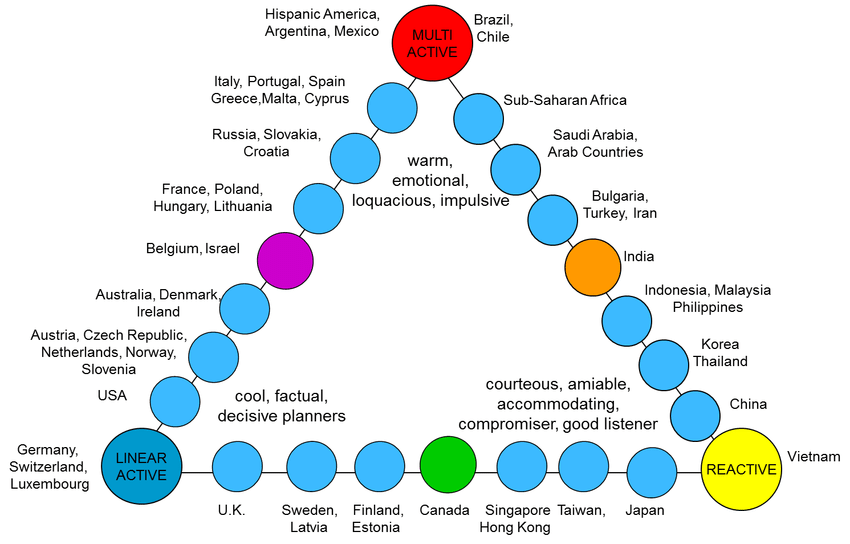Teams are becoming more and more international. Having different cultures in a team offers benefits, but could also lead to unexpected challenges.
OnTrack consultant Marianne Mol argues in favour of more attention to cultural awareness.
Some years ago Rupert Melsom, founder and board member of the Melsom Group spent a year on board a sail yacht participating in the Clipper Round the World Yacht Race. During the race Melsom understood that “leadership mostly is about giving others space so they can be successful in working with their personal ideas”. This is a valuable insight. The big question remains how does one do this in day to day life? Especially when leading a team consisting of people of very different (national) cultures? How do you keep your crew together in a global reality?
Unwritten rules become deep-rooted values
We were all raised with many ideas on how we should behave in specific social situations. Parents, teachers and friends teach us what is acceptable and unacceptable behaviour. These unwritten rules and regulations become deeply embedded values of which we hardly have any awareness. Leading an international team will confront you with team members that grew up in very different cultures with similarly different unwritten rules about what is acceptable and what is not.
(By: Kai Hammerich & Ricard D. Lewis)
It is easy to imagine what will happen if two adults of a different cultural origine start working together in the same team. Both approaching the same situation with totally different unwritten “social traffic regulations”of which neither one has awareness. In the working environment this may easily lead to misunderstandings, confusion, irritation and possibly even conflicts. Bearing all this in mind, the risk of a negative impact on (team)performance and business goals can be predicted.
Upset and astonishment
A simple example of a source of confusion and irration is the following, adapted from “When Cultures Collide; Leading across Cultures” by Richard D. Lewis. The origin of the described irritation lies in a different perspective on time and time-management.
Two colleagues, one German and the other Italian, had an appointment at 9. The German present at 9 sharp, ready to get started. The Italian arrives at half past to find a less than amused German colleague. The Italian is astonished about the annoyance and asks his colleague: “Why are you so angry about me arriving at half past?” The German colleague answers: “Because it says 9 in my diary”. The Italian responds, with unmistaken Italian logic: “Then why don’t you write half past 9 in your diary and the problem is solved?”. With whom of these colleagues would you sympathise?
In Germany, and also in The Netherlands (my home turf), it is paramount to arrive on time for an appointment; showing up late could easily be seen as a sign of unreliability or disrespect. Not so in Italy. Depending on how far north or south you find yourself it isn’t unusual to arrive up to 45 minutes late. Many reasons could lead to this acceptable delay. Most likely an earlier appointment had not been properly finished. Finishing an appointment (seen as a human transaction) properly to the average Italian is much more important than at what time a meeting starts.
The Lewis-Model for Culture
Time is only one cultural dimension of which groups of people may hold very different perspectives. Other dimensions are: patterns of communication and how control and responsibilities are experienced. These dimensions have been thoroughly investigated by specialists like Fons Trompenaars, Geert Hofstede and Philippe Rosinski. Forementioned Richard D.Lewis developped the Lewis-model for culture. In Lewis’ model a large number of cultures have been arranged in a triangle, which makes it clear how these cultures relate to each other. Each point of the corner of the triangle represents the extremity of one of three categories:

- Linear-Active cultures:countries in Northern Europe and the US, share the general idea that time is a scarce commodity which we should maximise by proper planning, concentrating on one thing at a time for a set amount of time and then switch to the next planned activity. Linear-actives are usually punctual people.
- Multi-Active cultures:like countries in Southern Europe and Latin America, where people also believe that time gone will never come back, but they believe the best investment of time is time spent to build and maintain relationships; such as a meeting with a business partner that is properly finished. Multi-actives generally enjoy doing more than one thing at a time and usually do not give much value to punctuality in itself.
- Reactive cultures: this category is mostly found in Asia. Reactives do not experience time as a scarce commodity. How can it be if we had a Wednesday last week, it is Wednesday today and next week will also bring us a Wednesday? The best way to invest your time is to work according to core-principles. Reactive people usually display punctual behaviour.
Of course this a very simplified way to describe these three categories; there are many other aspects to take into consideration. For this article this brief description will nevertheless suffice.
Forgetting about the cross cultural aspect
Cultural awareness means that one truly understands there are huge differences between what acceptable behaviour entails. It also means one is open to another man’s perspective without judgment. Many leadership development programmes do not include the cross cultural aspect to leadership and people management. To me this appears to be a missed opportunity. Cultural differences not only exist when a team consists of different nationalities; also within each nation cultural variations exist and within one company even departments or teams may display a variety of subcultures.
No right or wrong
Back to the situation of the German and Italian colleague: with whom do you sympathise? If you were born and raised in Germany, The Netherlands, The Nordics or the U.K. chances are you sympathise with the German’s upset. If your roots are in the southern part of Europe it is very likely you will understand the Italian’s astonishment. Both perspectives are understandable to people with different perspectives. Both perspectives have the same right to existance; there is no right or wrong. In order to deal with suchlike cultural differences a three-step process is advisable:
- Awareness:Be aware different perspectives may be present in any group of people
- Knowledge: Investigate the different perspectives that could be present by listening (properly!) and by sharing your personal perspective honestly and openly. Do not judge and also expect interlocutors not to judge.
- Skill: Agree on how the team will deal with appointments and punctuality (looking at the situation presented in this article).
Cultural Awareness a ‘need to have’
For any leader or manager it is of the utmost importance to handle this and similar situations actively and openly. This will enhance team effectiveness. Research (Dr. C.Kovach, UCLA) shows that multi-cultural teams, compared to homogeneous teams perform either below òr above average. Above average performance origines in the creativity both leadership and team members display with regards to the different perspectives present. Cultural diversity therefore offers strong possibilities.
Looking back at the insight Rupert Melsom developped during the Clipper race about giving people space to be succesful by working with their personal ideas, I dare conclude cultural awareness, knowledge and skills are a “need to have” in our highly globalised world. Be honest: we have the same right to call German “Pünklichkeit” rigid, as calling Italian flexibility disorganised or chaotic. Who are we to judge anyway?
Marianne Mol is an associate with OnTrack International and based in The Netherlands. From having lived and worked in the U.K. for several years she personally experienced the challenges of being part of a foreign culture. Professionally she turned this experience into a specialisation and joined Richard Lewis Communications as a Licensed Partner.
About the Author
Marianne delivers leadership- and team development programmes that improve effective co-operation throughout the organisation. She also supports professional pre- and post-expatriation . Marianne works and has worked with a range of global companies, both in- as well as outside The Netherlands.
She is experienced in working with delegates from all over Europe, Japan, India, South Africa and the U.S




